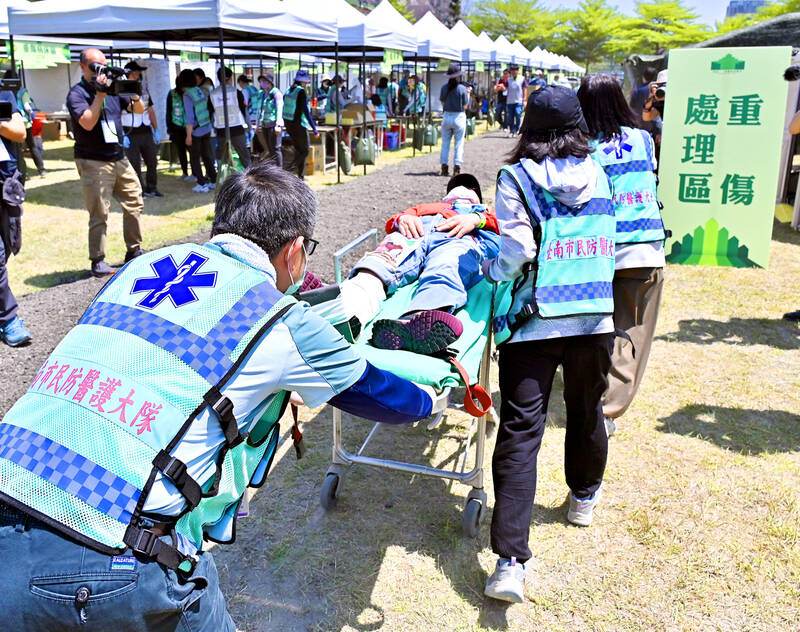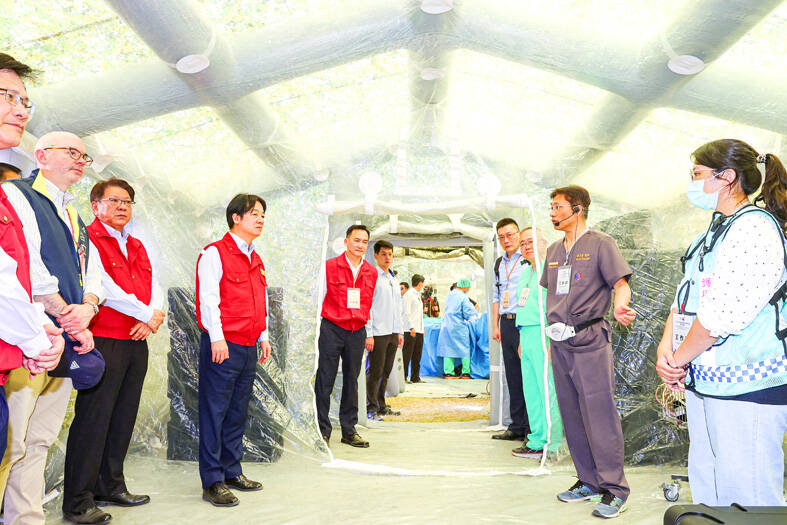President William Lai (賴清德) yesterday oversaw the first civil defense drills under his newly created social resilience committee simulating how to respond to a large-scale disaster such as a tsunami or attacks on critical infrastructure.
The drill in Tainan was held under the auspices of Lai’s new Whole-of-Society Defense Resilience Committee, set up last year to prepare to deal with natural disasters or other emergencies such as an attack by China.
Speaking to participants after viewing some of the drills, Lai said these were the first live drills for the committee and involved about 1,500 people, adding that there would be more next month.

Photo: Tu Chien-jung, Taipei Times
“The aim is to build the resilience of Taiwanese society to cope with large natural disasters or major accidents that cause a lot of injuries, or regional geopolitical changes. We dare not fail to prepare,” he added.
“As the saying goes, prevention is better than cure and we should rely not on the likelihood of the enemy not coming, but on our own readiness to receive him,” Lai said.
“We hope that through strength, not only of the military, but also the resilience of the entire society in defense, we can ensure Taiwan’s security and ensure that peace can be achieved through the demonstration of our strength,” he added.

Photo: CNA
Shortly after Lai spoke, the Ministry of National Defense said China yesterday held another “joint combat readiness patrol” around the nation with 28 fighter jets, drones and other aircraft, as well as warships.
The Tainan drills simulated scenarios such as a tsunami after a massive offshore earthquake and “explosions” at a passenger port terminal, evacuating casualties to triage centers and setting up emergency response command posts.
The drill was carried out based on a scenario in which an explosion occurred near the tourist service center at Anping Port (安平港), with an estimated 200 casualties at the scene.
Under tents, casualties were laid out on the ground and treated, as other officials used large whiteboards to keep track of their care and who had died or the level of injuries.
About 1,500 people were mobilized — including police officers, a special team from Anping Harbor, volunteers organized by local police stations and fire departments, and members of charity groups and businesses — to work alongside alternative service conscripts in the operation.
While the military, which is at the front lines of helping deal with actual disasters such as earthquakes, was not directly involved, the armed forces did lend equipment to set up outside operating theaters and other medical equipment.
Also in attendance and observing the drills were Vice President Hsiao Bi-khim (蕭美琴) and representatives from 13 governments, including the US, EU, Polish, Finnish and Indian representatives to Taiwan, among other senior foreign diplomats from the UK, Singapore, Japan, Israel, Canada and Australia.
American Institute in Taiwan Director Raymond Greene praised the performance in a statement.
“I was impressed to see community members, first responders, city officials and Taiwan’s central authorities unite and demonstrate the resolve and strength of the people in Taiwan to face future challenges,” he said.
Additional reporting by Kayleigh Madjar and CNA

CHAOS: Iranians took to the streets playing celebratory music after reports of Khamenei’s death on Saturday, while mourners also gathered in Tehran yesterday Iranian Supreme Leader Ayatollah Ali Khamenei was killed in a major attack on Iran launched by Israel and the US, throwing the future of the Islamic republic into doubt and raising the risk of regional instability. Iranian state television and the state-run IRNA news agency announced the 86-year-old’s death early yesterday. US President Donald Trump said it gave Iranians their “greatest chance” to “take back” their country. The announcements came after a joint US and Israeli aerial bombardment that targeted Iranian military and governmental sites. Trump said the “heavy and pinpoint bombing” would continue through the week or as long

TRUST: The KMT said it respected the US’ timing and considerations, and hoped it would continue to honor its commitments to helping Taiwan bolster its defenses and deterrence US President Donald Trump is delaying a multibillion-dollar arms sale to Taiwan to ensure his visit to Beijing is successful, a New York Times report said. The weapons sales package has stalled in the US Department of State, the report said, citing US officials it did not identify. The White House has told agencies not to push forward ahead of Trump’s meeting with Chinese President Xi Jinping (習近平), it said. The two last month held a phone call to discuss trade and geopolitical flashpoints ahead of the summit. Xi raised the Taiwan issue and urged the US to handle arms sales to

BIG SPENDERS: Foreign investors bought the most Taiwan equities since 2005, signaling confidence that an AI boom would continue to benefit chipmakers Taiwan Semiconductor Manufacturing Co’s (TSMC, 台積電) market capitalization swelled to US$2 trillion for the first time following a 4.25 percent rally in its American depositary receipts (ADR) overnight, putting the world’s biggest contract chipmaker sixth on the list of the world’s biggest companies by market capitalization, just behind Amazon.com Inc. The site CompaniesMarketcap.com ranked TSMC ahead of Saudi Aramco and Meta Platforms Inc. The Taiwanese company’s ADRs on Tuesday surged to US$385.75 on the New York Stock Exchange, as strong demand for artificial intelligence (AI) applications led to chip supply constraints and boost revenue growth to record-breaking levels. Each TSMC ADR represents

Pro-democracy media tycoon Jimmy Lai’s (黎智英) fraud conviction and prison sentence were yesterday overturned by a Hong Kong court, in a surprise legal decision that comes soon after Lai was jailed for 20 years on a separate national security charge. Judges Jeremy Poon (潘兆初), Anthea Pang (彭寶琴) and Derek Pang (彭偉昌) said in the judgement that they allowed the appeal from Lai, and another defendant in the case, to proceed, as a lower court judge had “erred.” “The Court of Appeal gave them leave to appeal against their conviction, allowed their appeals, quashed the convictions and set aside the sentences,” the judges